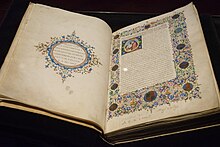Lorenzo Valla
He is best known for his historical-critical textual analysis that proved that the Donation of Constantine was a forgery, therefore attacking and undermining the presumption of temporal power claimed by the papacy.He was educated in Rome, attending the classes of teachers including Leonardo Bruni and Giovanni Aurispa, from whom he learned Latin and Greek.[7] Older biographies of Valla give details of many literary and theological disputes, the most prominent one with Gianfrancesco Poggio Bracciolini, which took place after his settlement in Rome.Between 1439 and 1440, Valla wrote the essay, De falso credita et ementita Constantini Donatione declamatio, which analyzed the document usually known as the Donation of Constantine.[11] This relationship possibly motivated his work; in any case, he was put on trial before the Catholic Inquisition in 1444, but was protected from imprisonment by the intervention of Alfonso V.[1] Valla demonstrated that the internal evidence in the Donation told against a 4th-century origin: its vernacular style could be dated to the 8th century.In this part of the treatise, which also circulated independently under the title Emendationes in T. Livium, Valla elucidates numerous corrupt passages and criticises the attempts at emendation made by Panormita and Facio, his rivals at the court of Alfonso V.[14] In his critical study of the official Bible used by the Roman Catholic Church, Jerome's Latin Vulgate, Valla called into question the church's system of penance and indulgences.[5][5] Collected editions of Valla's works, not quite complete, were published at Basel in 1540 and at Venice in 1592, and Elegantiae linguae Latinae was reprinted nearly sixty times between 1471 and 1536.

Jean-Jacques BoissardItalianRenaissance humanistrhetoricianeducatorscholarhistorical-critical textual analysisDonation of Constantinetemporal powerpapacyprecursorReformationPiacenzalawyerPapal CuriaLeonardo BruniGiovanni AurispaQuintilianapostolic secretaryBartolus de SaxoferratoPope Nicholas VLex de imperio VespasianiSaint John LateranSeyfried RybischPope Gregory XIIIPalazzo dei ConservatoriGianfrancesco Poggio BraccioliniLutherRobert BellarmineErasmusConstantine IWestern Roman EmpireRoman Catholic ChurchleprosyPope Sylvester IAlfonso V of AragonPapal StatesPope Eugene IVCatholic InquisitionanachronismsatrapPetrarchBartolomeo FacioPanormitaJeromeLatin VulgatepenanceindulgencesRichard Claverhouse JebbStoicsEpicurusProtestantsThomas CromwellDe libero arbitrioThe Consolation of Philosophygrammarrhetorichumanistic Latinpost-ClassicalPoggio BraccioliniLeuvenCollected editionsCross, F. L.Livingstone, E. A.OxfordOxford University PressEnciclopedia TreccaniZalta, Edward N.Stanford Encyclopedia of PhilosophyGeneral OneFileJohn Addington SymondsJakob BurckhardtHerzogJohn Edwin Sandyspublic domainChisholm, HughEncyclopædia BritannicaProto-ProtestantismJovinianClaudius of TurinGottschalk of OrbaisRatramnusBerengar of ToursPatariaBerengariansTanchelmPeter of BruysHenry of LausanneArnold of BresciaPeter WaldoMilíč of KroměřížJohn WycliffeMatthias of JanovMarsilius of PaduaArnoldistsWaldensiansLollardyStrigolnikiFriends of GodPetrobrusiansJan HusJan ŽižkaMikuláš of PelhřimovPetr ChelčickýJohannes von GochJohann Ruchrat von WeselWessel GansfortJacques Lefèvre d'ÉtaplesGirolamo SavonarolaLuke of PragueBohemian ReformationHussitesTaboritesUtraquismCzech BrethrenPiagnoniOldcastle RevoltHussite WarsCompacts of BaselPeace of Kutná HoraMérindol massacreSavoyard–Waldensian warsPiedmontese EasterWycliffe BibleHussite BibleJistebnice hymn book